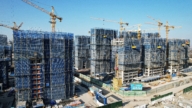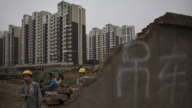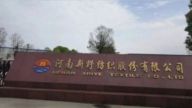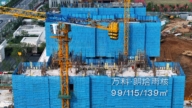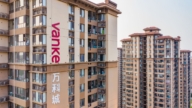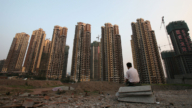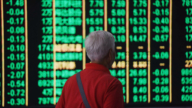【新唐人2012年8月25日訊】「滙豐銀行」最新公布的資料顯示,中國8月份「製造業採購經理指數」(PMI)在榮枯分水嶺下方,降到9個月以來新的低點,顯示中國製造業持續面臨困境,而出口訂單指數也創下09年以來新低,出口訂單指標大幅惡化,市場對中國經濟回暖信號的期待又一次落空。專家們認為,中國經濟已經走入死胡同。
8月份滙豐中國「製造業採購經理指數」PMI指數跌到47.8,8月份新出口訂單指數也降到44.7,低於7月份的46.7,創出2009年3月以來的最低水準。
金融信息服務公司Markit提供的新聞稿顯示,中國大陸的新訂單和新出口訂單指數雙雙大幅度惡化,同時,產出分項指數降到五個月來新低,庫存指數則大幅逆向上升,顯示製造者經營壓力增大。
資料提供商CapitalVue聲稱,整個8月份鋼鐵價格一直下跌,目前已接近2009年來的低位。反映出房地產、基礎設施建設和製造業的鋼鐵需求疲軟。
而中國的金融市場也在持續走軟。上證綜合指數上個月纍計下跌2.6%。
美國「南卡羅來納大學艾肯商學院」教授謝田:「中國經濟,我認為全面進入停滯的狀態,我們看到:不管從庫存、工業生產者物價指數到進出口、其他零售、業績指標全面進入了硬著陸的狀態。」
北京《國情內參》期刊首席研究員鞏勝利指出,中國經濟已經走入死胡同。
北京《國情內參》首席研究員 鞏勝利:「出口方面急劇下跌,這是第一方面,第二駕馬車,改革開放以來,國內的消費一直都不正,第三駕馬車,中國投資好像拉不動,中國經濟面臨的問題比較複雜,比美國比歐洲還要更複雜一些。」
在經濟發展速度持續放緩的情況下,中共中央政府日前決定,簡化對涉及實體經濟、小微企業發展和民間投資的審批程序,並在南部廣東省率先試行,以幫助刺激經濟的發展。
大陸一些地方政府也相繼推出所謂「大手筆」的投資計劃,試圖在2009年中央政府出臺4萬億經濟刺激計劃之後,再次上演由地方政府為主角的,以投資刺激經濟發展的新舉措,不過這些投資還是著眼於基礎設施建設。
謝田:「這種增長是低品質的、浪費型的、實際上是虛假的,有幾萬公里的高速公路沒有汽車跑,好多機場沒有航班,這種浪費的方法繼續下去的話,除了增長通貨膨脹的話,對人們生活沒有甚麼好處。」
鞏勝利說,08金融海嘯後,中國計劃經濟的大幅度擴張,使中國的經濟走上了一條不歸路。
鞏勝利:「計劃經濟在擴張,市場經濟在收縮,就是中國經濟自由的調節能力在減弱,比如市場經濟國家來講,他們基本上是讓經濟自己修復、自己調節,在中國,因為行政干預太多太多,所以經濟一直處在一個最高的警戒水準。」
之前,中國央行曾在短短一個月內兩度降息,發改委也加快部分專案審批進度,不過,中國今年二季度GDP(國內生產總值)同比增長7.6%,還在延續近兩年的下行態勢,是1992年以來增長回檔時間最長的一次。
採訪編輯/劉惠 後製/蕭宇
August PMI Signifies Chinese Economy Reaching A Dead End
According to the latest information from “HSBC", the August
Manufacturing Purchasing Managers’ Index (PMI) has hit bottom and is down to a nine-month new low.
China’s manufacturing industry continues to face difficulties.
The export orders index also hit its lowest level since 2009,
a significant deterioration in export orders.
The expectations of the market to pick up were crushed.
Experts believe that China’s economy has reached a dead end.
In August, while HSBC’s PMI index fell to 47.8,
its new export orders index also dropped to 44.7,
down from 46.7 in July, reaching its lowest level
since March 2009.
The press release, provided by Markit,
a financial information services company, shows that
mainland China’s new orders and new export orders
both deteriorated substantially.
Meanwhile, the output sub-index dropped to a five-month low,
while the stock index rose sharply in a reverse manner and
displayed an increase operational pressure on manufacturers.
The data provider CapitalVue claimed that entire steel prices
have been falling in August, nearing the 2009 low.
It reflects a weak demand for steel from real estate,
infrastructure, construction, and manufacturing.
China’s financial markets have continued to weaken.
The Shanghai Composite Index fell 2.6% last month cumulatively.
Xie Tian, professor of University of South Carolina Aiken
Business School: “I think that China’s economy has entered completely into a state of stagnation.
From retail performance indicators to inventory, the industrial
producer price index to the import and export, all indicate a hard landing."
A principal researcher from National Conditions and Internal
Reference", Gong Shengli says that China’s economy has hit a dead end.
Gong Shengli:” Exports fell sharply, that is the first aspect.
Second, since the reform and opening up,
the domestic consumption has not been positive.
The third is that Chinese investment is stagnant.
The problems faced by the Chinese economy are more complex
than that in the United States or in Europe."
Under the continuous slow down of economic development,
the Chinese Central Committee has decided to simplify
the approval process relating to the real economy,
the development of small and micro enterprises,
and private investment.
The first trial will be in the southern Guangdong Province
to help stimulate economic development.
Many local governments have also launched the so-called
“big ticket" investment plan, new initiatives to stimulate economic development.
The local government will play a main role after the central
government introduced a 4 trillion economic stimulus plan in 2009.
However, these investments are still aimed at
the construction of infrastructure.
Xie Tian: “This growth is low quality, wasteful,
and in fact phony.
There are tens of thousands of kilometers of highways
without cars and airports without flights.
If such a waste continues, what good would it do for people’s
life besides more inflation.”
Gong Shengli said that after the financial tsunami,
a huge expansion of China’s planned economy has put its economy onto a path of no return.
Gong Shengli: “Planned economy is expanding,
but the free economy is shrinking.
That means the ability to regulate economic freedom
in China weakened.
In a market economy country,
they basically let the economy fix their own regulation.
However, administrative intervention in China is so much
that the economy has been at the highest alert level."
Previously, China’s central bank has cut interest rates twice
in just one month,
the NDRC also accelerated the progress of the project approval,
however, in the second quarter of this year,
China’s GDP (gross domestic product) grew by 7.6%,
and has still continued the downward trend for nearly two years.
It is the longest growth retreat since 1992.



